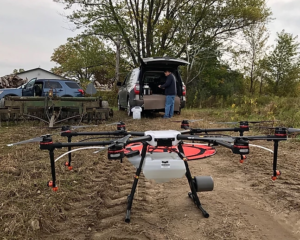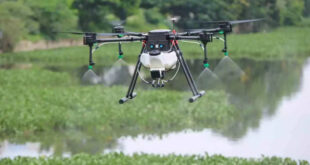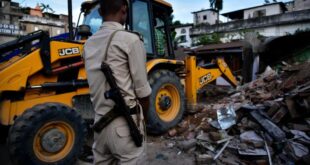Image courtesy: Empire Drone Company
New York-based UAS firm Empire Drone Company has received a Part 137 certification from the FAA, paving the way for the company to launch crop-spraying missions.
Crop-spraying via drone has emerged as a blossoming trend in precision agriculture over the last five years. Unmanned missions are more cost-effective, covering about 24 acres per hour. In addition, drone flights don’t require risking the lives of pilots on manned missions. Drones can also spray more accurately over specific acreage as compared to airplanes, reducing the amount of potential run-off.
“We are incredibly excited to be one of the first companies in New York to be given the go-ahead by the FAA to spray crops with drones,” Empire partner Sean Falconer said.
“This new spraying service, in combination with our agricultural drone sensors and spraying drone sales offerings, help make us the one-stop-shop drone resource for agricultural professionals in New York State and beyond.”
Last year, researcher Shahzad Nahiyoon deployed drones to eradicate locusts in his home province of Sindh in Pakistan. His drones can spray between six to 10 hectares per hour, using tanks that can hold up to 20 liters of pesticides.
In 2017, rice farmer Wen Bohua began spraying his 50-acre farm in China using a $20,000 drone from Guangzhou-based Xaircraft. After word spread of his amazing new aerial technique, Wen has now sprayed more than 1,600 acres in his home province of Hubei.
Drone crop-spraying soared in China over a three-year period from 500 to 8,000 missions.
As of November, the FAA had issued only 25 Part-137 exemptions.
As aviation attorney Jonathan Rupprecht explains:
“Part 137 specifically defines the applicability of this Part of the Code of Federal Regulations. Agricultural aircraft operation means the operation of an aircraft for the purpose of:
- Dispensing any economic poison,*
- Dispensing any other substance intended for plant nourishment, soil treatment, propagation of plant life, or pest control, or
- Engaging in dispensing activities directly affecting agriculture, horticulture, or forest preservation, but not including the dispensing of live insects.”
* File this under “The More You Know.”
Federal law defines “economic poison” as:
(1) any substance or mixture of substances intended for preventing, destroying, repelling, or mitigating any insects, rodents, nematodes, fungi, weeds, and other forms of plant or animal life or viruses, except viruses on or in living man or other animals, which the Secretary of Agriculture shall declare to be a pest, and (2) any substance or mixture of substances intended for use as a plant regulator, defoliant or desiccant.
Jason is a longstanding contributor to DroneLife with an avid interest in all things tech. He focuses on anti-drone technologies and the public safety sector; police, fire, and search and rescue.
Beginning his career as a journalist in 1996, Jason has since written and edited thousands of engaging news articles, blog posts, press releases and online content.
Email Jason
TWITTER:@JasonPReagan
Subscribe to DroneLife here.
https://dronelife.com/2020/01/31/how-a-new-york-drone-firm-harvests-crop-spraying-missions/
 Unmanned Aerial Vehicle The latest drone news
Unmanned Aerial Vehicle The latest drone news




